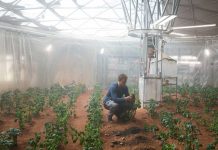Montreal — On the eve of UN talks to assess progress towards the Sustainable Development Goals (SDGs), an international group of distinguished business, government, and science leaders say we cannot achieve a climate-safe, sustainable, and equitable world without ensuring a secure, safe, and trusted internet for all.
The SDGs set out a transformative agenda that aims to simultaneously end poverty, address environmental decline, and reduce inequalities, all by 2030. But it missed setting a goal for governing perhaps the most powerful force defining humanity’s future: the digital age.
In a joint Montreal Statement on Sustainability in the Digital Age the experts argue that tackling the climate crisis and achieving broader sustainability goals is indivisible from creating a secure, equitable, and trusted digital world; these are all one interconnected agenda. And they outline five near-term, cross-cutting actions that can enable rapid and widespread societal transformations to a low-carbon, secure and equitable future. This lays the foundation for what could define a much needed action agenda for a new SDG on governing the digital world in support of people and planet.
Developed with the support of leading research and philanthropy organizations from four countries – Canada, the UK, France, and the USA – the statement unites voices of digital and sustainability experts working at the intersection of technology, sustainability and policy. It is released as the UN’s high-level political forum prepares to meet virtually July 7-16th to launch a Decade of Action toward the 17 SGDs and assess the impact of the Covid-19 pandemic.
The statement will be discussed during a side-event at the forum on July 9, exploring collaborative action for digital capacity building to implement the UN’s 2030 SDG Agenda.
The statement calls for:
- Developing a social contract for the digital age, to ensure individual rights, justice and equity, inclusive access, and environmental sustainability;
- Ensuring open and transparent access to data and knowledge critical to achieving sustainability and equity;
- Building public and private collaborations to develop and manage AI and other technologies in support of sustainability and equity;
- Investing in research and innovation that focuses on transdisciplinary challenges and opportunities underlying the systems that are maintaining our unsustainability; and
- Promoting targeted communication, engagement and education to advance the social contract.
The statement was conceived and initially formulated at a September 2019 workshop in Montreal, Canada, one of a series on AI & Society, funded by CIFAR in partnership with UK Research and Innovation (UKRI) and France’s Centre National de la Recherche Scientifique (CNRS), organized by Future Earth, the UK Office for AI, the International Observatory on the Societal Impacts of Artificial Intelligence and Digital Technologies (OBVIA), and CNRS.
The need for global cooperation in the digital realm was similarly underlined recently by the UN Secretary-General. In June, António Guterres released a roadmap for filling the digital governance gap, creating a foundation to effectively leverage digital tools to achieve broad sustainability goals, including climate change mitigation.
In parallel, the Montreal Statement is part of a new international initiative – Sustainability in the Digital Age – which seeks to support and strengthen the growing diversity of actors engaging with the interconnected digital and sustainability agendas.
The statement continues to be endorsed by innovators, researchers, and decision makers working at the interface of digital and environmental sustainability, committed to collaborating to drive change.
Endorse the statement here
https:/
Approuver la déclaration ici
https:/
The statement was developed with funding from:
- CIFAR
- Fonds de recherche du Québec (FRQ)
- UK Research and Innovation (UKRI)
- French National Center for Scientific Research (CNRS)
- Climateworks Foundation
Collaborators:
- Future Earth
- UN Environment Programme
- UN Development Programme
- UK Office for AI
- German Environment Agency (Umwelt Bundesamt)
- The Observatory of Social Impacts on AI and Digital Technology
- Element AI
- Mila
- Barcelona Supercomputing Center
- CIO Strategy Council
Endorsements:
- International Science Council
- DNV GL
- Concordia University
- Stockholm Resilience Centre
- Exponential Roadmap Initiative
- Axionable
Collaborators and Endorsers reflect on the Montreal Statement
“Humanity today is interconnected through, and dependent on, both the digital and natural worlds. As a result, tackling the climate crisis and the broader sustainability agenda, and working toward a just equitable digital future are increasingly intertwined agendas. It is time to recognize the need to work toward a new SDG — SDG 18– focused on ensuring that the Digital Age supports people, planet, prosperity, peace, and partnerships.”
– Amy Luers, Executive Director, Future Earth. Director, Sustainability in the Digital Age initiative
“We need to bet big on digital technologies, because they provide the kind of exponential transformative power needed to achieve the SDGs. We are making great progress applying digital technologies to help tackle sustainability challenges, but we are still not cooperating enough across the public and private sectors to drive the scale, speed and direction of change we need. The Montreal Statement on Sustainability in the Digital Age outlines areas where we urgently need to take more collaborative action to govern the technology sector and build a digital ecosystem for people and planet.”
– David Jensen, Head of Environmental Peacebuilding, UN Environment Programme
“Digital technologies are a major force in driving the changes in both society and environment we need to achieve the Sustainable Development Goals (SDGs). With COVID-19 disrupting economies, exacerbating inequalities and setting back developmental progress, countries with a stronger culture of innovation and more developed digital infrastructure have been able to mitigate the negative impacts of the crisis and set on the path to recovery quicker. Digital technology has shown the potential to be a development catalyst. The Montreal Statement on Sustainability in the Digital Age sets out an important framework for collaboration to enable this important work.”
– Robert Opp, Chief Digital Officer, UN Development Programme (UNDP)
“As highlighted in this Montreal Statement, as the power of digital technologies such as AI increases, I believe that it becomes all the more important to set up social norms and encourage efforts towards both a wiser governance – to minimize misuse – and steering technological investments towards betterment of society – AI for social good, e.g. fighting climate change – rather than the additional concentration of wealth, power and inequity which is otherwise likely to follow, at the expense of sustainability and a just society.”
– Prof. Yoshua Bengio A.M. Turing Award, 2018; Scientific Director, Mila; Full professor, University of Montreal; Co-Founder, Element AI
“As the international community reflects on how we can respond to the pandemic in a way that puts us on a sustainable recovery track, we are recognizing the central role that the digital world will play. This makes the challenges of access, equity, and trust in the digital sector urgent, if we are to be able to steer its massive potential towards a path that will accelerate SDG achievement. The Montreal Statement provides a guide for collaboration and action to steer the digital revolution in support of human-centred, sustainable development.”
– Dirk Messner, President, German Environment Agency (UBA)
“The broader international science community is just beginning to explore the powerful opportunities and profound challenges of the digital age, both for science and for society. At the ISC we have adopted this as one of our four key domains of action. The Montreal Statement on Sustainability in the Digital Age, outlines important areas of work that need to be pursued through the closer engagement of science with partners from policy and wider publics.”
– Heide Hackmann, CEO, International Science Council (ISC)
“Here at BSC, we are committed to working with others to respond to this call to action. We are already doing work in several areas highlighted in the Montreal Statement using high performance computing and big data infrastructures to provide reliable climate services leading to resilient societies. We create public-private partnerships to provide stakeholders open and transparent access to data and knowledge.”
– Asun Lera St. Clair, Senior Advisor, Barcelona Supercomputing Centre – BSC DNVGL Digital Assurance
“Element AI firmly believes that we have a civic duty to contribute to environmental and social wellbeing, and as such we are proud to collaborate on the Montreal Statement on Sustainability in the Digital Age, and will be active in our commitment to respond to the calls for action.”
– Anne Martel, Chief Administrative Officer and Co-Founder, Element AI
“I invite our leaders to take action on the Montreal Statement on Sustainability in the Digital Age, elaborated under the leadership of Future Earth and in collaboration with many international partners. The development of digital innovations such as artificial intelligence, which transform our societies and can bring growth and progress, should be done in conjunction with the achievement of UN’s Sustainable Development Goals to create a climate-safe, sustainable, and equitable world.”
– Rémi Quirion, Chief Scientist of Québec
“AI is transforming the way we live and work so it is critical that we act now to find solutions that promote trustworthiness, equity, inclusion and sustainability. Through CIFAR’s AI & Society program, we were pleased to support the international workshop that catalyzed some of the early work in the development of the Montreal Statement.”
– Rebecca Finlay, Vice President, Engagement & Public Policy, CIFAR.
“AI technologies have an unavoidable role to play in reducing global contributions to the climate crisis. By embracing the fourth industrial revolution we may consciously create a future for AI development that is fair and equitable for the planet. The Montreal Statement on Sustainability in the Digital Age outlines areas of collaboration needed to achieve this goal. The scale of disruption required to achieve net zero emissions requires a full transformation of our economies and societies, and must be embedded into national strategies if we are to match our words with actions. Having legislated for net zero, the UK is embracing the challenge and we continue on this path as a founding member of the Global Partnership on Artificial Intelligence (GPAI), an international and multistakeholder initiative to guide the responsible development and use of AI, grounded in human rights, inclusion, diversity, innovation, and economic growth.”
– Sana Khareghani, Deputy Director, Head of Office for Artificial Intelligence, UK
“As a host of Future Earth, Concordia University shares its vision through the work of researchers across a variety of fields who are driven by the conviction that technological innovation should provide opportunities for greater social respect and inclusion while lowering our ecological footprint. This work can play a key role in ensuring a digital future that is both informed by, and continuously advancing sustainable principles. The Montreal Statement is a consolidation of this vision and a welcome call for transformative action now.”
– Graham Carr, President, Concordia University
###
Future Earth is an international research organization, collaborating with science and society on solutions to global sustainability challenges. It encompasses nearly 30 research-to-action networks, groups of scientists and practitioners around the world, studying the environmental and human aspects of global change. We help incorporate the latest scientific knowledge into decision-making, with a mission to accelerate transformations to sustainability through research and innovation.
Future Earth is governed by the International Science Council (ISC), the Belmont Forum of funding agencies, the United Nations Educational, Scientific, and Cultural Organization (UNESCO), the United Nations Environment Programme (UNEP), the United Nations University (UNU), the World Meteorological Organization, and the Science and Technology in Society (STS) forum.














